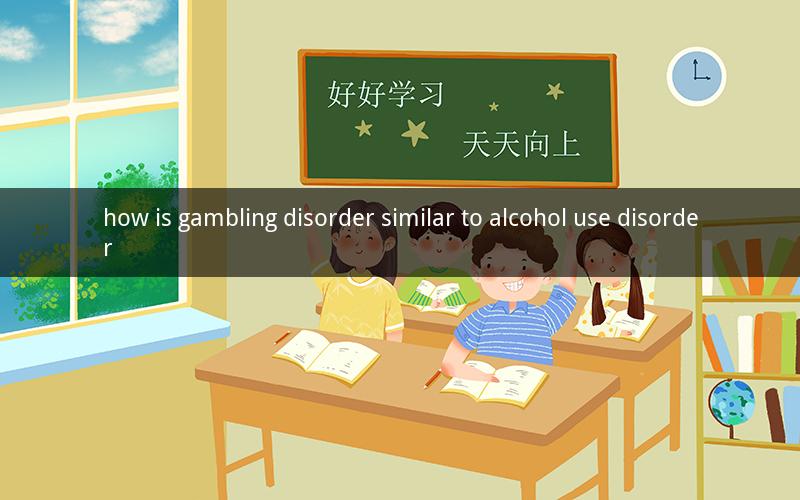
Table of Contents
1. Introduction to Gambling Disorder and Alcohol Use Disorder
2. Common Symptoms and Signs
3. Psychological and Biological Factors
4. Impact on Social and Professional Life
5. Treatment and Intervention Strategies
6. Prevention and Awareness
7. Conclusion
1. Introduction to Gambling Disorder and Alcohol Use Disorder
Gambling disorder and alcohol use disorder are both chronic conditions that affect individuals' ability to control their behavior. While they are distinct in their manifestations, these disorders share several similarities that highlight the complexity of addictive behaviors. Understanding these similarities can provide valuable insights into the nature of addiction and the potential for effective treatment and prevention strategies.
2. Common Symptoms and Signs
Both gambling disorder and alcohol use disorder exhibit a range of symptoms and signs that can be indicative of an underlying addiction. Common symptoms include:
- Loss of Control: Difficulty in controlling the amount of money spent on gambling or alcohol consumption.
- Preoccupation: Spending a significant amount of time thinking about gambling or alcohol.
- Continued Use Despite Consequences: Continuing to engage in the behavior despite negative consequences such as financial, social, or health problems.
- Tolerance: Needing to increase the amount of money or alcohol to achieve the desired effect.
- Withdrawal: Experiencing withdrawal symptoms when attempting to stop or reduce gambling or alcohol use.
3. Psychological and Biological Factors
The development of both gambling disorder and alcohol use disorder is influenced by a combination of psychological and biological factors. These include:
- Genetic Predisposition: Research suggests that a genetic component plays a role in the development of both disorders.
- Environmental Factors: Exposure to a culture that promotes gambling or alcohol use can increase the risk.
- Stress: Both disorders are often associated with coping mechanisms to deal with stress or emotional pain.
- Brain Chemistry: Similar neurotransmitter systems are involved in both disorders, leading to the same addictive effects.
4. Impact on Social and Professional Life
The consequences of both gambling disorder and alcohol use disorder can be profound, affecting various aspects of an individual's life:
- Financial Strain: Excessive gambling or alcohol consumption can lead to significant financial loss.
- Social Relationships: The behavior can strain relationships with family, friends, and colleagues.
- Occupational Performance: Impaired judgment and decreased productivity can lead to job loss or demotion.
- Health Risks: Both behaviors are associated with a range of health issues, including liver disease, heart problems, and mental health disorders.
5. Treatment and Intervention Strategies
Effective treatment for both gambling disorder and alcohol use disorder often involves a combination of approaches:
- Cognitive Behavioral Therapy (CBT): Helps individuals recognize and change negative thought patterns and behaviors associated with addiction.
- Medication: Certain medications can help reduce cravings or alleviate withdrawal symptoms.
- Support Groups: Programs like Gamblers Anonymous and Alcoholics Anonymous provide peer support and resources for recovery.
- Family Therapy: Helps family members understand the disorder and develop strategies to support the individual in recovery.
6. Prevention and Awareness
Preventing the development of gambling disorder and alcohol use disorder involves raising awareness and implementing strategies to reduce risk factors:
- Education: Providing information about the risks and consequences of both disorders can help individuals make informed decisions.
- Community Outreach: Programs that target high-risk populations can help identify and intervene early.
- Policy Changes: Implementing regulations that limit access to gambling and alcohol can reduce the potential for addiction.
7. Conclusion
Gambling disorder and alcohol use disorder share several similarities that underscore the complex nature of addictive behaviors. By understanding these similarities, healthcare professionals, policymakers, and individuals can work together to develop effective prevention, treatment, and support strategies for those affected by these disorders.
---
10 Questions and Answers
Question 1: What is the primary difference between gambling disorder and alcohol use disorder?
Answer: While both are addictive behaviors, gambling disorder involves an impulse control disorder, whereas alcohol use disorder is characterized by a substance dependence.
Question 2: Can someone have both gambling disorder and alcohol use disorder?
Answer: Yes, it is possible for an individual to have co-occurring disorders, where they struggle with both gambling and alcohol addiction simultaneously.
Question 3: How can genetic predisposition influence the development of gambling disorder?
Answer: Genetic predisposition can affect the brain's reward system, making individuals more susceptible to the pleasurable effects of gambling or alcohol, which can lead to addictive behaviors.
Question 4: What role does stress play in the development of gambling disorder?
Answer: Stress can trigger the release of stress hormones, which can lead individuals to seek relief through gambling as a coping mechanism, potentially leading to addiction.
Question 5: How can cognitive behavioral therapy help in treating gambling disorder?
Answer: CBT helps individuals identify and modify the thoughts and behaviors that contribute to their addiction, promoting healthier coping strategies and reducing the urge to gamble.
Question 6: Are there any medications specifically for treating gambling disorder?
Answer: While there are no medications specifically for gambling disorder, certain medications can be used to treat symptoms like anxiety or depression that may accompany the disorder.
Question 7: What can family members do to support a loved one with gambling disorder?
Answer: Family members can offer emotional support, encourage participation in support groups, and learn about the disorder to better understand and cope with the challenges their loved one faces.
Question 8: How can community outreach programs help prevent gambling disorder?
Answer: Community outreach programs can educate the public about the risks of gambling, provide resources for those at risk, and implement policies that limit access to gambling venues.
Question 9: What is the role of policy changes in preventing alcohol use disorder?
Answer: Policy changes, such as raising the legal drinking age, enforcing drunk driving laws, and limiting alcohol advertising, can help reduce the prevalence of alcohol use disorder.
Question 10: Can gambling disorder be cured?
Answer: While there is no cure for gambling disorder, it can be effectively managed through treatment and ongoing support, allowing individuals to lead fulfilling lives in recovery.